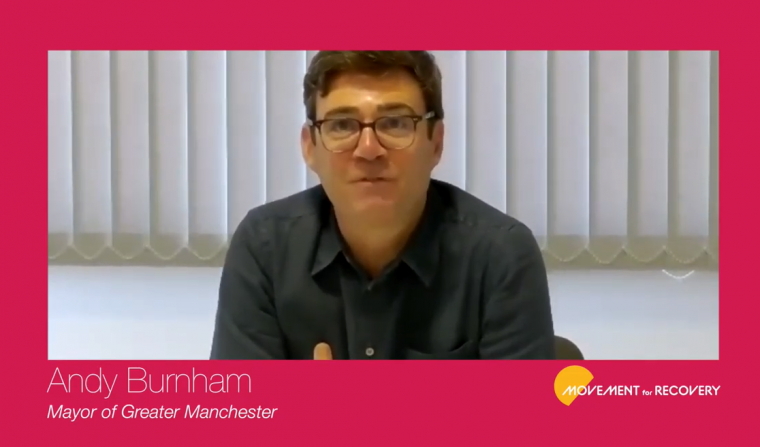'You are the glue of our communities,' Andy Burnham tells faith leaders

The Labour Mayor of Greater Manchester, Andy Burnham, has told a group of church leaders that "faith can reach areas that politicians never can" in helping communities to recover from the Covid crisis.
Mr Burnham was speaking to the National Assembly of the Movement for Recovery (MfR) via a pre-recorded Zoom interview on Tuesday.
Led by Rev Roger Sutton, Co-Chair of the Trafford Borough Strategic Partnership, the MfR launched in June last year after a Zoom call with Mr Burnham attended by around 130 church leaders.
Mr Burnham told the MfR assembly: "Recovery is going to be hard. The academic side of educational recovery is going to be funded – tutors for some – but the social and emotional side of children's recovery from all of this doesn't appear to be funded.
"People on this call in some ways are better placed to deal with the spiritual and emotional side of things than public agencies ever will be.
"So we are going to have to adopt a whole-society approach to this."
Mr Burnham, who served as Health Secretary from 2009 to 2010 in the Labour government led by Gordon Brown, added: "A reflection from when I was a minister in government – it was just how reticent national government was to work with the faith community...because they thought it would cause division.
"But you are the glue of our communities, the bedrock, and the resource you potentially offer to us is massive if we can understand how to mobilise it.
"As a country we've never really done that. We've never mobilised our faith communities together and the unity part of this is really important.
"That might be a challenge for some of you on this call, in terms of your relationships locally with different organisations. But the power comes from the togetherness.
"Faith can reach areas that politicians never can."
The Labour Mayor of Bristol, Marvin Rees, also addressed the assembly. He described national government as "a bottleneck" that cannot move with the "pace and dynamism" needed to enable Covid recovery.
"Government does need to make space for other people, other talent, other energies to come through," said Mr Rees, a practising Christian who began his working life with the evangelical international development agency, Tearfund.
"Churches need to set an example. If we're going to come and ask politicians to chart a pathway to reconciliation across race and class lines and care for the poor, it's not a prophetic act to demand that of politicians and point out why the world is rubbish. Show us how it's done. Be the living example."
Mr Burnham said he was going to contact his fellow metropolitan mayors to inform them about the MfR and the potential for churches in the network to help with post-Covid social action locally.
Including Mr Burnham, there are 10 metro or 'combined authority' mayors in England serving Greater London, the Liverpool City Region, the West Midlands, Tees Valley, the West of England, which includes Bristol, Cambridgeshire and Peterborough, West Yorkshire, the Sheffield City Region, and the North of Tyne.
According to the Institute for Government, "Including Greater London, 41% of England's population (representing 43% of economic output but just 14% of land area) now live in areas with some form of mayoral devolution deal."
Rev Sutton, a former Baptist minister, said the MfR arose out of the national Gather network of 120 Christian unity movements in UK towns and cities. He said that churches in the Gather network, which launched 10 years ago, were mainly evangelical, Pentecostal and charismatic but the movement now included Roman Catholic churches.











